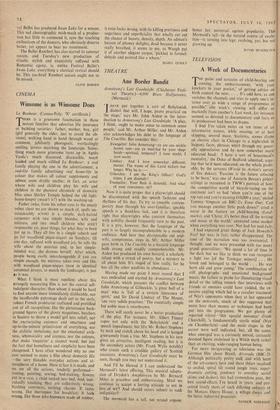TELEVISION
A Week of Documentaries THE pains and ecstasies of .child-bearing one evening, the embarrassment, 'with your knickers in your pocket,' of getting advice on birth control the next. . . . It's odd how, as one switches the channels and tries to apply one's in- terest over as wide a range of programmes as possible One week's viewing will differ so markedly from another's. Last week, for instance, seemed as devoted to documentary and facts as its predecessor had been to drama.
I find I've taken notes on ten items of an
informative nature, while missing, or at best skipping, several more. Statistics, scenes (from an electric chair in Chicago to a night-club in Saigon), faces, phrases whirl through my gener- ally appreciative and by now somewhat more educated head: 'I have a sort of housemaid's mentality,' the Duke of Bedford admitted, argu- ing that he'd been educated, on the whole profit- ably, by the servants (World In Action's survey of five dukes); 'Fascism is the future refusing to be born,' was one Of Aneurin Bevan's pithier sayings as recounted in TWW's portrait of him; the competitive world of bicycle-racing on the continent isn't so bad 'when you're one of the top rats and you're earning £10,000 a year,' smiled Tommy Simpson on BBC-2's Time Out; 'Can you manage another little push down?' cried a nurse in the feature on child-bearing (Land- marks), and 'Christ, it's better than all the writing and music in the world,' answered some mother when everything was over. Not bad for mid-July.
I had expected great things of Jack Howells's Nyel but was, in fact, rather disappointed. The tone of the narration was too reverential, I thought, and we were presented with too many grand generalities: 'We spend a lot of time in the dark but we like to think we can recognise a light too [of the Tredegar miners] . . . He loved and belonged to the world . . . He was born old and grew young.' The combination of still photographs and emotional background music, the failure to probe for illuminating visual detail or the telling remark that interviews with friends or enemies could have yielded, the ex- cessive angling which led to a cavalier treatment of Nye's opponents when they at last appeared on the newsreels, much of this suggested that mdre love than money or technique had been put into the programme. We got plenty of reported vitriol—`this squalid nuisance' (from Churchill), 'a fundamentally sterile mind' (Nye on Chamberlain)—and the main stages in the career were well indicated, but, all the same, what emerged was a curiously unreal, curiously doomed figure enshrined in a Welsh myth rather than an exciting, wide-ranging human being.
Far more invigorating as television was the
German film about Brazil, Alvorada (BBC-2). Although politically pretty null, and with hints of the art-camera here and there (blurr resolved to orchid, spiral tilt round jungle trees, super- dramatic cutting, tendency to overplay aerial skims and dashes), this had tremendous pace, the best sound-effects I've heard in years, and pre- sented lovely shots of such differing subjects as the Manaos Opera House, a village dance and the latest industrial processes.
















 Previous page
Previous page